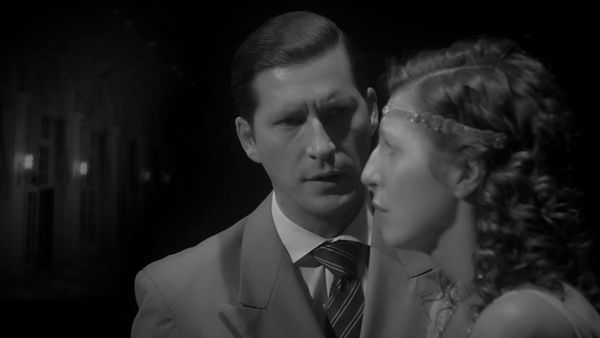Eye For Film >> Movies >> Train To Zakopané (2018) Film Review
Train To Zakopané
Reviewed by: Jennie Kermode

Most of us have had the experience, at one time or another, of being stuck in a train carriage with unpleasant company. In 1928, writer/director Henry Jaglom's father took a train across Poland, a three-day journey at the time. He found himself surrounded by anti-Semites who, with no inkling that he was a Jew, freely discussed their contempt for Jewish people. Most vociferous among them was a young woman, Katia, to whom he felt an instant attraction; so when she flirted back, he vowed to himself that he would seduce her and afterward disclose his identity in an attempt to break her heart. But things didn't quite go to plan.
Recreating his father's story, Jaglom plunges us into the mood of the era with a late Thirties style black and white palette, strong lighting and soft focus on earnest faces. His players draw on the film's theatrical roots to deliver mannered performances well suited to that period style. Mike Falkow plays the older Jaglom (who briefly appears in person to introduce parts of the story) with a light touch that makes him convincing as a man used to having to perform, charm and obfuscate for safety's sake, yet we see enough of what's going on beneath the surface to recognise his pain, even before the revelation of just how much anti-Semitism has cost him. Opposite him, in the role of Katia, Tanna Frederick displays all the charms of the pin-up girls of the era even as her character spews out hate. It's difficult to make us like this pointedly malicious young women, but Frederick imbues her with just enough fragility, enough sense of naivety and personal experience of suffering, to let us understand how the hero's initially vengeful feelings become complicated.
The introductory part of the film is slow and its effectiveness depends quite a bit on the viewer. If you rarely encounter hate speech or if you routinely have to cope with anti-Semitic hatred yourself, you're liable to find it quite shocking or upsetting, delivering a big emotional impact. Because Falkow is playing a man who is restraining his own emotions, however, there's not much for viewers who are less dramatically affected by this to connect with, and it's harder for the film to get a grip. As a tentative affair begins, however, the film picks up pace. Frederick has room to show us a different side of Katia, and our awareness of what she doesn't know contributes to mounting tension, leading to a powerful ending.
Hanging over all this, of course, is our awareness of just how much worse anti-Semitism in Europe was about to get, and of how many relationships were torn apart by the chaos of wartime even after enjoying more auspicious beginnings. Like a train journey, Train to Zakopané offers us a moment briefly cut off from the rest of history, an opportunity to observe and reflect. This sense of limited time - and space - concentrates the characters' emotional experiences and highlights how easily such experiences can lead to distorted conclusions in an environment saturated with propaganda, poisoned by age old prejudice. Jaglom contextualises anti-Semitism with reference to class exploitation and the impact of poverty. There is a sense that the characters can no more control their own destinies than they can control the relentless progression of the train. They are caught up in tides bigger than themselves, but as they are forced to take responsibility for what they do, they have an opportunity for self-actualisation, for a kind of freedom.
Much more intellectually complicated than the average romance, Train to Zakopané may be heading to the expected destination but there's a lot to see along the way.
Reviewed on: 07 May 2018















